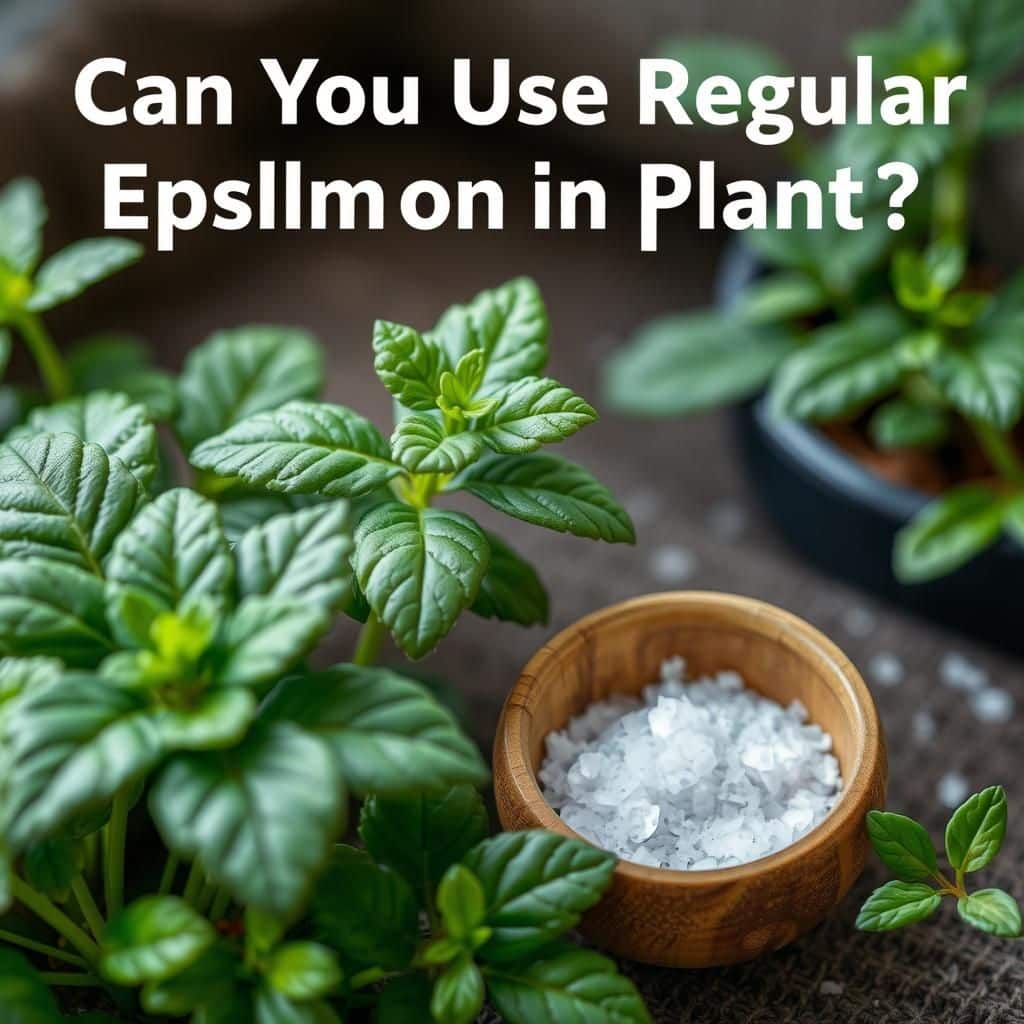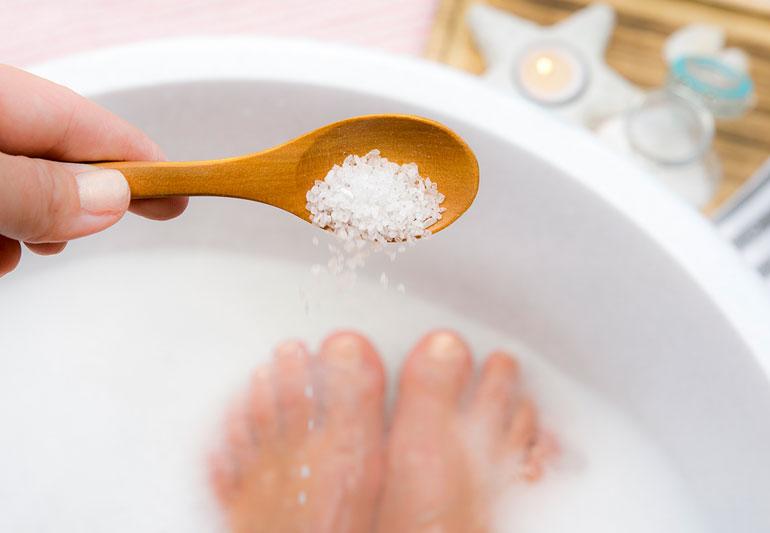Can You Use Regular Epsom Salt on Plants? Discover the Benefits and Best Practices

Epsom salt, a compound of magnesium sulfate, has long been praised for its various uses, from bathing to gardening. As gardeners seek organic and natural solutions to enhance plant health, the question arises: can regular Epsom salt be used on plants? This article delves into the potential benefits of Epsom salt for plants, including how it can promote growth, improve nutrient absorption, and boost flowering. Additionally, we will explore best practices for its application to ensure optimal results. Discover how this simple household ingredient can transform your gardening experience and help your plants thrive.
Can You Use Regular Epsom Salt on Plants?
Yes, you can use regular Epsom salt on plants, as it provides essential nutrients such as magnesium and sulfur. These minerals play a significant role in plant health, aiding in processes like photosynthesis, nutrient uptake, and overall growth. Epsom salt is often utilized as a natural fertilizer to enhance soil quality, particularly for plants that require a higher level of magnesium, such as roses, tomatoes, and peppers. However, it is important to use it in moderation, as excessive application can lead to nutrient imbalances in the soil.
Benefits of Using Epsom Salt on Plants
The primary benefit of using Epsom salt on plants is its ability to supply magnesium, which is vital for photosynthesis and chlorophyll production. Additionally, it helps improve nutrient absorption, facilitating the uptake of essential elements like nitrogen, phosphorus, and potassium. Moreover, Epsom salt can enhance the overall health of the plants, leading to better flowering, fruiting, and increased vigor.
How to Apply Epsom Salt to Plants
To apply Epsom salt to plants, dissolve about one tablespoon of salt in a gallon of water and use it as a foliar spray or soil drench. For potted plants, you can mix one teaspoon of Epsom salt into the soil every month. When applying it to gardens, sprinkle it in the soil before planting or at the base of existing plants. It is recommended to water the plants lightly after application to ensure proper absorption of the nutrients.
Plants That Benefit from Epsom Salt
Many plants can greatly benefit from the addition of Epsom salt. Notably, tomatoes, roses, peppers, and leafy greens (such as spinach and lettuce) thrive with added magnesium, promoting healthier growth and fruit production. Cucumbers and carrots can also see improvements in flavor and yield. Epsom salt can be particularly useful in magnesium-deficient soils, which can affect several crops.
Potential Risks of Using Epsom Salt
While Epsom salt is generally safe for plants, excessive use can lead to nutrient imbalances in the soil, negatively affecting plant health. High concentrations of magnesium can interfere with the absorption of other essential nutrients like calcium and potassium. Therefore, it is important to test your soil before applying and ensure that Epsom salt is used in moderation to prevent any adverse effects on plant growth.
Alternative Sources of Magnesium for Plants
If you prefer not to use Epsom salt, there are other sources of magnesium available. These include dolomitic lime, magnesium sulfate, and organic compost. Each of these alternatives can provide magnesium without the risks associated with over-application of Epsom salt. Organic matter, such as compost, also improves soil structure and promotes a healthier ecosystem in the soil.
| Plant | Benefit from Epsom Salt |
|---|---|
| Tomatoes | Improved fruit production and flavor |
| Roses | Enhanced flowering and overall health |
| Peppers | Better growth and higher yields |
| Leafy Greens | Increased vigor and taste |
| Cucumbers | Improved flavor and yield |
Can I use regular Epsom salt for my plants?


Yes, you can use regular Epsom salt for your plants. Epsom salt, chemically known as magnesium sulfate, is rich in magnesium and sulfur, both of which are essential nutrients for plant health. When used appropriately, Epsom salt can help improve nutrient uptake, stimulate growth, and enhance the overall health of your garden. Here’s a detailed look at its benefits and proper usage:
Benefits of Epsom Salt for Plants
Epsom salt provides numerous benefits for plants that can lead to healthier growth and better yields. Key benefits include:
- Enhances Nutrient Absorption: Magnesium helps plants absorb important nutrients more effectively, leading to better overall health.
- Stimulates Growth: The addition of magnesium supports chlorophyll production, which is essential for photosynthesis, aiding in growth.
- Improves Flowering and Fruit Production: Epsom salt can also encourage blooming and increase fruit yield, particularly in flowering plants.
How to Use Epsom Salt in Your Garden
Using Epsom salt in your garden is fairly simple, but it's important to apply it correctly to avoid any adverse effects. Here’s how you can do it:
- Soil Application: Mix 1-2 tablespoons of Epsom salt into the soil when planting.
- Watering Solution: Dissolve 1 tablespoon of Epsom salt in a gallon of water and use this to water your plants monthly.
- Foliar Spray: Mix 1 tablespoon of Epsom salt with a gallon of water and spray directly on the leaves for quick absorption.
Plants That Benefit Most from Epsom Salt
Not all plants may require Epsom salt, but several types particularly benefit from its use. These include:
- Tomatoes: They often require extra magnesium for fruiting.
- Peppers: Increased magnesium can enhance growth and yields.
- Roses: They thrive with added magnesium, resulting in healthier blooms.
Precautions When Using Epsom Salt
While Epsom salt can be beneficial, it is crucial to use it in moderation. Some important precautions include:
- Avoid Overapplication: Too much Epsom salt can lead to nutrient imbalances.
- pH Levels: Regular testing of soil pH is advised, as Epsom salt can influence acidity.
- Specific Needs: Not all plants require extra magnesium; assess your plants' needs before applying.
Alternative Uses of Epsom Salt in Gardening
Epsom salt has various other applications beyond fertilizing plants:
- Pest Control: Can deter slugs and other pests when sprinkled around plants.
- Seed Germination: Soaking seeds in Epsom salt solution can help improve germination rates.
- Soil Amendment: Helps in improving soil structure and drainage.
Does it matter what type of Epsom salt you use?

Epsom salt, composed of magnesium sulfate, is widely used for various purposes, including relaxation, muscle relief, and gardening. The type of Epsom salt you use can influence its effectiveness and application. While all Epsom salts contain magnesium sulfate, the source, purity, and any additives can vary significantly. Below is a detailed exploration of whether the type of Epsom salt matters.
See also:
What Are the Different Types of Epsom Salt?
Epsom salt mainly varies based on its purity and formulation. Here are some common types:
- Standard Epsom Salt: This is the most commonly found type in stores, used for treating muscle soreness and promoting relaxation.
- Organic Epsom Salt: Made from natural minerals, this type is usually free from synthetic additives and preferred by those who favor organic products.
- Food-Grade Epsom Salt: This type is safe for culinary uses, such as in food preservation or consumption, ensuring it’s safe and pure.
Does Purity Matter in Epsom Salt?
Absolutely, the purity of Epsom salt can affect its effectiveness. Impurities can lead to varied results in relaxation or muscle relief. Here are some considerations:
- Quality Control: Higher purity typically means greater effectiveness and safety in usage.
- Additives: Some Epsom salts contain fragrances or colors that may irritate sensitive skin.
- Source of the Mineral: Different sources may have trace minerals that could potentially enhance or detract from the benefits.
Can Scented Epsom Salt Be Beneficial?
Scented Epsom salts often include essential oils that can provide additional benefits aside from the magnesium sulfate. However, they can also have downsides:
- Aromatherapy Benefits: Scented variants may enhance relaxation through aromatherapy effects.
- Skin Sensitivities: Fragrances may cause allergic reactions or irritations in sensitive individuals.
- Distraction from Therapeutic Effects: Strong scents might distract from the soothing properties of the soak.
How Does Epsom Salt Affect Different Uses?
The type of Epsom salt can vary its effectiveness depending on its intended use. Here are some areas affected:
- Bathing: High-quality, pure Epsom salt is ideal for soothing baths that relieve muscle pain.
- Gardening: Certain formulations offer added nutrients beneficial for plants, particularly magnesium.
- Health Remedies: Using food-grade Epsom salt is essential for safe consumption in home remedies.
Are There Alternatives to Epsom Salt?
While Epsom salt is valued for its magnesium content, alternatives exist that may suit specific needs better. Consider the following:
- Baking Soda: Known for its soothing properties, often used in baths to relieve itching and irritation.
- Himalayan Pink Salt: Contains trace minerals and is popular for detoxifying and enhancing bath experiences.
- Dead Sea Salt: Rich in minerals, this type is prized for its therapeutic benefits in skin conditions.
Questions from Our Readers
Can regular Epsom salt be used on all types of plants?
Using regular Epsom salt on plants can be beneficial for many types, particularly those that require additional magnesium and sulfur. However, it's important to do so cautiously, as not all plants thrive with the same nutrients. Always research the specific needs of your plants before applying Epsom salt.
How often should Epsom salt be applied to plants?
Epsom salt can be applied to plants typically every 4-6 weeks during the growing season. It’s advisable to dissolve it in water before application to ensure better absorption. Overuse can lead to nutrient imbalances, so moderation is key for healthy plant growth.
What are the signs that my plants need Epsom salt?
Plants that show yellowing leaves, especially between the veins, may indicate a magnesium deficiency, which could be remedied by Epsom salt. Additionally, poor blooming or fruiting can also suggest that your plants would benefit from this supplement. Monitor your plants' health to determine if Epsom salt is needed.
See also:
How should Epsom salt be applied to plants?
Epsom salt can be applied either dissolved in water as a foliar spray or sprinkled directly into the soil. When using it in a foliar spray, ensure that it's applied during cooler parts of the day to avoid leaf burn. This method provides a quick nutrient boost to support overall plant health.

If you want to read more articles like Can You Use Regular Epsom Salt on Plants? Discover the Benefits and Best Practices, we recommend you check out our Plants category.
Leave a Reply
Related Articles